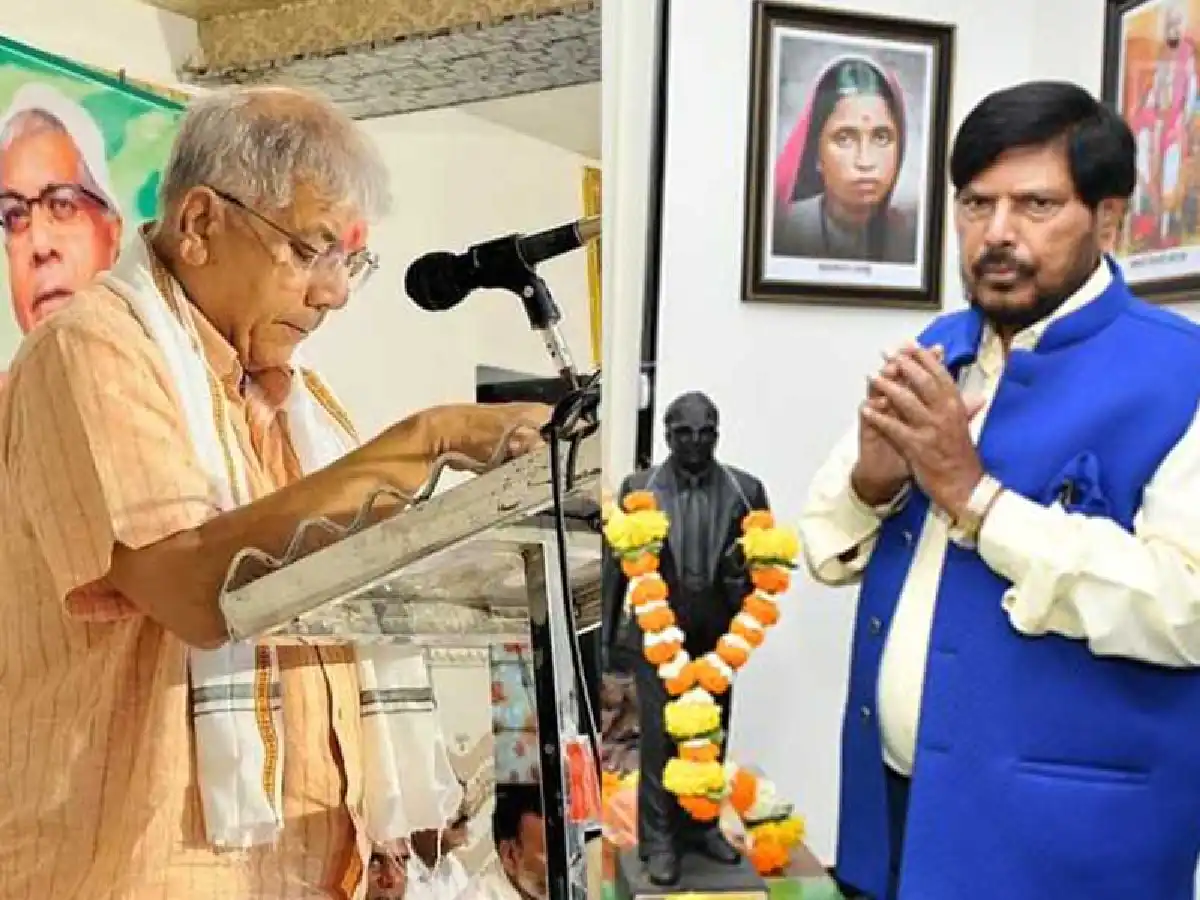There is a competition between BJP led NDA Mahayuti and Congress leadership All India Alliance (Maha Vikas Aghadi). However, the two Dalit parties are sidelined in the coalition. Prakash from Ambedkar’s Bahujan Vikas Aghadi did not form an alliance with The Saath India alliance. Ramdas Athawale’s party RPI is certainly aligned with NDA, however, it has only been allocated two seats in the seat sharing agreement. It is evident that Dalits in Maharashtra who have a political base seem to be on the outskirts in such a scenario.
Ramdas Athawale, a minister in the Modi government, has been associated with the NDA for a total of 12 years. The RPI (A) led by Athawale has established a political stronghold in Maharashtra. Because of this, he requested 8 to 10 seats in the upcoming assembly elections. In the NDA seat sharing, RPI (A) received just two seats. BJP allocated the Kalina assembly seat from its quota and the Dharavi seat from the Shiv Sena quota controlled by the Shinde faction. Athawale is dissatisfied with receiving two seats, yet he is unable to separate himself from BJP even if he desires to do so.
Prakash Ambedkar, hailing from the lineage of Constitution architect Dr. Bhimrao Ambedkar, is the second Dalit representative in Maharashtra politics. Prakash Ambedkar planned to run in the elections with India Alliance, but their agreement on seat distribution was not finalized. Prakash’s party Bahujan Vikas Aghadi has joined the electoral competition by creating a third front in that scenario. In a similar manner, the BSP, a third party in Dalit politics, is attempting to contest the Maharashtra elections independently. Besides this, the situation of other Dalit parties is identical.
In Maharashtra, the Dalit community makes up approximately 12% of the population and is split between Mahar and non-Mahar castes. The Dalit society consists of approximately 60 various castes. Around half of the Dalit population is made up of the Mahar caste. 50 percent of the population belongs to castes such as Kori Khatik, Matang, Bhed, Chamar, Dhor, Dom Aulakh, and Gotraaj. The Mahar community, in particular, embraced Buddhism as advocated by Dr. Bhimrao Ambedkar within the Ambedkarite movement, rejecting caste discrimination and advocating for social equality.
Approximately half of the Dalit population is comprised of Neo-Buddhists (Mahars). Their focus in politics revolves around social justice and empowerment, opposing parties such as BJP and Shiv Sena. The Mahar caste-dominated Republican Party was politically established by Ambedkar, but it quickly divided into multiple factions. For instance, there were three factions within the Republican Party: Athawale faction, Ambedkar faction, and Gaikwad faction. These Dalit parties were forced to become puppets of the Congress in order to survive. In this manner, the Mahar caste stayed fully aligned with either the Congress or the political party established by the Mahar castes.
The Republican parties were too feeble to control the Assembly and Lok Sabha by themselves. Winning the municipal corporation seat was out of the question for them. She lacked the ability to achieve it. In that scenario, Congress would have allocated two to four assembly seats in the deal, to which she agreed and was content. By giving BJP one or two seats, Prakash Ambedkar has been able to satisfy them without contesting for 30 to 40 seats, which has left Congress with no place in the India-led coalition. Ramdas Athavale from Mumbai, the Western Maharashtra region, and Marathwada region had hoped to run for elections on twelve seats, but ultimately only secured two seats in the NDA.
In Maharashtra, 12 percent of Dalits are allocated 29 assembly seats. The districts of Vidarbha, Pune, Nagpur, and Thane have the largest number of Scheduled Castes residents. Other than the 29 designated seats, there are approximately 59 assembly seats where Dalits make up nearly 20 percent of the population. Looking at the results of the 2019 elections for the 88 Dalit-dominated assembly seats, BJP and Shiv Sena secured victory in 46 seats, whereas the Congress-NCP alliance emerged victorious in 33 seats. Nevertheless, the political dynamics have shifted drastically this time, with Dalit voters playing a crucial role.
Congress defeated the BJP-led NDA alliance over the Constitution and reservation story. Congress, Uddhav Thackeray’s Shiv Sena (UBT), and Sharad Pawar’s NCP emerged victorious in 30 out of the 48 Lok Sabha seats in the India Alliance. Eknath Shinde’s Shiv Sena and Ajit Pawar’s NCP were able to secure victory in 17 seats. Concerns about potential Constitution modifications and reservation elimination brought Dalit voters together, leading to the India Alliance winning in 51 of the 88 assembly seats with a Dalit majority. Congress is once again attempting to attract Dalit votes using the same strategy.
BJP is concentrating on non-Mahar castes in order to attract Dalit voters. This plan specifically focuses on the Matang group, who have a stronger connection to Hindu cultural traditions compared to the Ambedkarites. In addition, BJP is aiming to garner support from Dalit castes such as Kori, Khatik, Bhed, Chamar, Dhor, Dom. In order to do this, the BJP supports categorizing Dalit reservation to allow non-Mahar castes to be included.
Ramdas Athawale’s RPI and Prakash Ambedkar’s Bahujan Vikas Aghadi have a political following primarily made up of the neo-Buddhists, specifically the Mahar castes. Because of this, they are incapable of participating in any political maneuvering because they cannot earn the confidence of other social groups.
The situation involving Kanshi Ram’s Bahujan Samaj Party is even more intricate. It is not solely a Dalit party, but rather a party representing Bahujans which include Dalits, OBCs, Adivasis, and minorities, at least in theory. Not all of them need to agree to follow Buddhism.
Mayawati and BSP appear to have strayed from this direction, leading to BSP’s inability to establish its political foundation.

